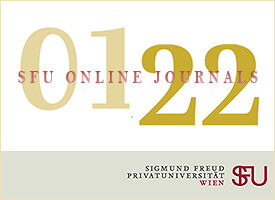Dear readers,
we are happy to announce that the first issue of the SFU Research Bulletin 2022 is out.
At the beginning of this issue, the psychotherapy scientist and cultural anthropologist Bernd Rieken examines a small fictional people called the Minions, who first took centre stage in the 2015 film of the same name. The central question, which the author answers with the help of individual-psychological and ethnological theories, explains to the reader in a plausible way why and to what end the cheeky little fellows always lose their boss and thus opens up a new understanding for their incessant search for a new master.
In the second article, the focus is on the sky. In her article, psychotherapy scientist and flight attendant Lisa-Marie Radl sheds light on the effectiveness of crisis intervention measures to prevent stress disorders among flight attendants. For this purpose, the author was able to cooperate with the Austrian airline Austrian Airlines and conduct a qualitative case study. The student gives the reader a good insight into the controversial debate about the effectiveness of current crisis intervention measures and critically examines them.
Ms Sepideh Firouzi, a clinical psychotherapist who works in Tehran and is a doctoral student of the International Programme at SFU Vienna, brings variety to the newly published issue with her English-language article on the treatment options for borderline personality disorder. The Iranian compares the different treatment strategies and explores the advantages and disadvantages of each in a very exciting way.
The opening of the new Short Articles section is started by Paolo Raile. The psychotherapist, life and social counsellor as well as founder and director of two psychosocial organisations in Vienna expands Kurt Greiner’s concept of the psycho-image method to include the possibility of creating videos. In doing so, the author not only discusses the specifics of trans-medialising theory text elements into audiovisual elements, but also outlines two approaches in an understandable way.
Kurt Greiner, professor of psychotherapy science at SFU Vienna, rounds off the issue with his tried and tested cartoonment (cartooment = argument + cartoon). In his fourth contribution in this series, he wants to show why effectiveness studies cannot say anything about the scientific status of psychotherapy modalities. He underpins all this with short but concise text passages and drawings that bring a certain lightness to a complex topic.
As usual, the issue is concluded by a contribution from the Institute of Statistics. Sophie Gattermeyer, Iris Enengl and Jan Aden explain in an understandable way the interactions and interdependencies within the framework of Mixed ANOVA in the psychotherapy research context.
Finally, dear readers, we have some news of our own: Martin Poltrum and Martin Jandl, the editors of the last six issues, have decided to hand over their office to other hands.
Carlos Watzka will now be the responsible editor for the two issues in 2022 and will announce further changes in the next issue. At this point I would like to take the opportunity to sincerely thank the former editors for the good, competent and smooth cooperation! Both of them have shaped the journal with their high level of professional competence and have always paid attention to a balanced interdisciplinary approach. You have always supported me as well as the authors in word and deed and have done valuable work with your great commitment, expertise and collegiality, never losing sight of the human aspect – be it a sympathetic ear, help with editing, understanding of challenges, etc. Dear Martin, dear Martin – thank you very much!
We wish you a relaxing and carefree summer – enjoy reading!
Univ. Ass. Maria Gren,
Sigmund Freud University Vienna
maria.gren@sfu.ac.at
